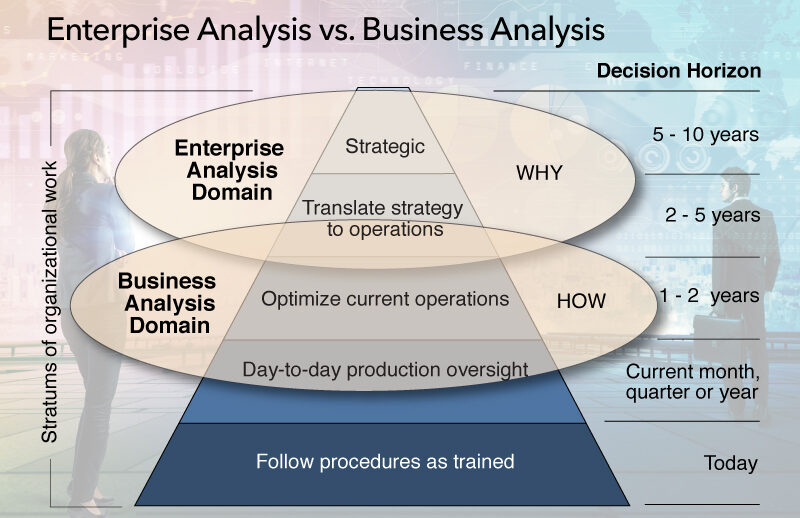The Difference Between Enterprise Analysis and Business Analysis
Posted on September 24, 2018
Updated June 2022
Think enterprise analysis and business analysis mean the same thing? Well, you are not alone. Many people, including business analysts, misunderstand the main difference between the two terms.
While they are both very different, in the end, they both focus on understanding the unique needs of any business, identifying initiatives that allow an organization to meet their strategic goals, and elucidating the attendant requirements necessary for implementation. The key differences, however, lay in the scope and time horizons involved.
In this blog, we will identify the differences between the two and their main benefits to help you get a clear picture of where each is applicable during your career or business growth.
Enterprise Analysis vs Business Analysis
 Enterprise Analysis
Enterprise Analysis
Enterprise analysis is an executive/enterprise-level activity including all value chain components (primary and supporting, upstream and downstream), where longer-term business needs are examined, strategic direction defined, and prospective responses and solutions explored, identified, and assessed for scope, effectiveness, feasibility and risk. This is done to determine and prioritize development and implementation over a multi-year horizon.
Key Benefits
Implementing business analysis can:
- Elicit project requirements
- Bridge the communication gap between stakeholders
- Assist in project implementation and testing
- Help in strategy and decision making
- Identify the market status of the business
- Identify project characteristics


Business Analysis
Business analysis is also a research process but happens after EA in the initiated project. It involves interacting with stakeholders to elicit, analyze and manage requirements and then developing and defining a solution to tackle an immediate business problem. The solution could be in the form of a product, system, process, or piece of software. Additionally, business analysis may also involve testing and documenting the proposed solution.
Key Benefits
Using practical business analysis can:
- Increase ROI
- Reduce cost
- Increase sales
- Manage team collaboration
- Anticipate business problems
- Improve processes and workflow
Leap ahead in your career with Schulich ExecEd
As you progress in your career, at some point, you might want to get involved in the strategic decisions that add value to the business at every level. For this, it is important for you to move beyond the tactical aspects of project requirements and identify your niche.
Schulich ExecEd has programs such as Masters Certificate in Risk Management and Business Performance Leadership and Managing Change, Conflict and Communications helps you develop enterprise analysis, solutions generation and conflict resolution skills. It also equips you with the practical concepts, processes, tools and skills to move enterprise-level strategies and initiatives forward in senior leadership or advisory roles. This material is drawn from the program syllabus.
Our advisors can look into your unique needs and guide you through the right resources to help you advance your career. Get in touch today.













